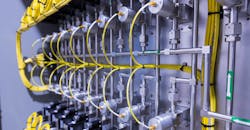Daimler joins Sila Nano in search for next gen lithium-ion battery
Daimler AG acquired a minority equity stake in U.S. battery material specialist Sila Nanotechnologies as part of its research and development activities, the OEM announced this week.
Founded in 2011, Sila Nano is a developer of new battery materials, which it says outperform existing lithium-ion technologies. It recently set a new standard for battery performance, the company reported, saying it harnessed the potential of silicon to enable safe, scalable, high-energy density batteries, which can unleash new possibilities in electrification from consumer devices to electric vehicles and beyond.
Along with the acquisition of the equity stake, Daimler will get a seat in the Board of Directors of Sila Nano. The investment forms part of the latest round of financing, which was led by Daimler.
“We are on our way to a carbon-free future mobility,” said Sajjad Khan, Daimler’s executive vice president for connected, autonomous, shared and electric mobility. “While our all-new EQC model enters the markets this year we are already preparing the way for the next generation of powerful battery electric vehicles. Lithium-ion technology is currently the most efficient battery technology available, and still shows plenty of potential for the future. The advancements Sila Nano have made in battery performance are very promising. We are looking forward to a fruitful cooperation, pooling our know-how on further development and fast commercialization.”
Improvements to traditional Li-Ion battery chemistry have reached their limits and Sila Nano’s cross-disciplinary team of scientists and engineers have pushed forward the development of the next generation of battery chemistry, harnessing the power of silicon to be safe, robust, and scalable for mass production.
“This breakthrough chemistry demonstrates up to 20% improvement today, with the potential to reach further improvements over state of the art traditional Li-ion,” said Gene Berdichevsky, co-founder and CEO of Sila Nano. “We’re excited to be working with Daimler to bring better, more energy-dense batteries to their fleet and bring our shared vision for the future of electric vehicles to life for more people.”
The company, headquartered in Alameda, CA, replaces conventional graphite electrodes entirely with its proprietary silicon-dominant composite materials that enable high energy density and high cycle life, which translates to more powerful, longer-range and enduring sources of power for electric vehicles. These materials easily drop into existing Li-ion factories, making it possible to deploy efficiently and at scale.
About the Author
Fleet Owner Staff
Our Editorial Team
Kevin Jones, Editorial Director, Commercial Vehicle Group
Cristina Commendatore, Executive Editor
Scott Achelpohl, Managing Editor
Josh Fisher, Senior Editor
Catharine Conway, Digital Editor
Eric Van Egeren, Art Director
